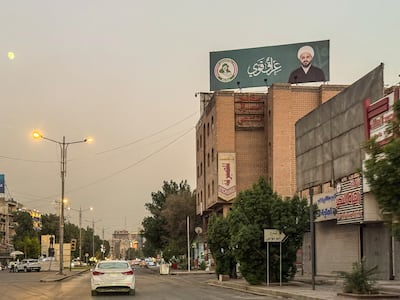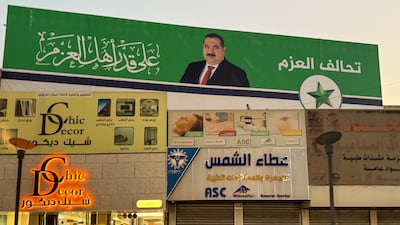From job opportunities and better health care to paving roads and restoring electricity, Iraqi politicians are trying to bring in voters with familiar appeals – as they make an early start on their election campaigns.
Iraq is set to hold national elections on November 11, the country’s sixth polls since the 2003 US-led invasion that toppled Saddam Hussein's regime. These elections are expected to be highly competitive among major religious and ethnic groups.
The country’s election law stipulates that the Independent High Electoral Commission decides when the campaigns begin, which is usually a month before polling day. IHEC says it is still vetting the names of the candidates and it will announce the date once they are all approved.
However, some candidates have already started their campaigns with billboards erected in streets displaying their smiling portraits and lofty promises of a better future.

They have also been visiting impoverished neighbourhoods and throwing lavish banquets for guests in their sprawling palaces, shaking hands and portraying themselves as friendly and approachable figures.
“We have been, we continue to be, and we will always be a nation,” reads a giant orange billboard for Takadum Coalition, which is led by former parliament speaker Mohammed Al Halbousi, who has emerged as a prominent Sunni political leader in recent years.
Most of his support comes from his home province of Al Anbar, in western Iraq, where he formerly served as governor. The most prominent candidate for Takadum Coalition in Al Anbar is Haibat Al Halbousi who is leading the campaign in his hometown.
“Do you have a degree in petroleum engineering?” Mr Al Halbousi asked a newly graduate in one of his videos published on TikTok. He promised the young man to secure a job with the US oilfield services company Schlumberger which has been contracted to develop Akkas gasfield in Al Anbar.
“I have all your details. There are 240 petroleum engineers. I will meet you next week,” he said. “I’ve agreed with the company before signing the contract to hire you,” he continued.
At the office of Shiite female politician Aliya Nusayif, a group of Iraqis with disabilities gathered for electric wheelchairs and food parcels. Ms Nusayif is running in the Prime Minister Mohammed Shia Al Sudani’s Reconstruction and Development Coalition.
A video published on her Facebook page casts her as a benefactor for the vulnerable. Critics, however, dismissed it as a calculated electoral stunt.
“Now you can go out to the street with it,” she told a paralysed man as the camera filmed, and aides documented the moment for social media. “Say thank you” to Ms Nusayif, an aide told another man after sitting in his wheelchair.
Many Iraqis view these election campaigns with scepticism, even mockery.
“This is the season when they suddenly remember the poor,” said Rajab Hameed Ali, a street vendor in Baghdad’s Karrada district. “They come with their smiles and promises, but after the elections, we don’t see them again,” Mr Ali, 56, a father of three, added.
The campaign season has already taken on a controversial edge.
Mr Al Sudani, who is seeking a second term in office, has been accused by rivals of leveraging state resources and official platforms to boost his re-election chances.
His frequent public inaugurations of new projects, expansion of welfare programmes, and promises of land plots and easing regulations are seen by critics as blurring the line between governance and campaigning.

In a move aimed at ensuring electoral integrity, Iraqi President Abdul Latif Rashid suggested a series of proposals to guarantee fair and transparent elections, according to the document announced by his office in mid-August.
They called for halting government appointments and asked that the distribution of land plots must meet regulations “far from electoral promises”, and that state resources are not exploited.
These proposals were later approved by Iraq's four government branches – the cabinet, presidency, parliament and the judiciary council – with a call on the electoral commission to adopt them and set the penalties for violators.
IHEC has previously warned against premature campaigning and other violations, but “enforcement is weak,” an official told The National. “Candidates know they can get away with starting early or making any violations,” he said. “The state institutions are too politicised to restrain them,” he added.
On the ground, however, many Iraqis remain doubtful that the elections will bring change.
“We are watching these campaigns with a mixture of cynicism and amusement,” said Nassir Mohammed Jaafar, a maths teacher.
“But behind the satire is real frustration,” Mr Jaafar said. “People want change, yet they feel trapped in the same cycle of promises and disappointment from the same faces.”


